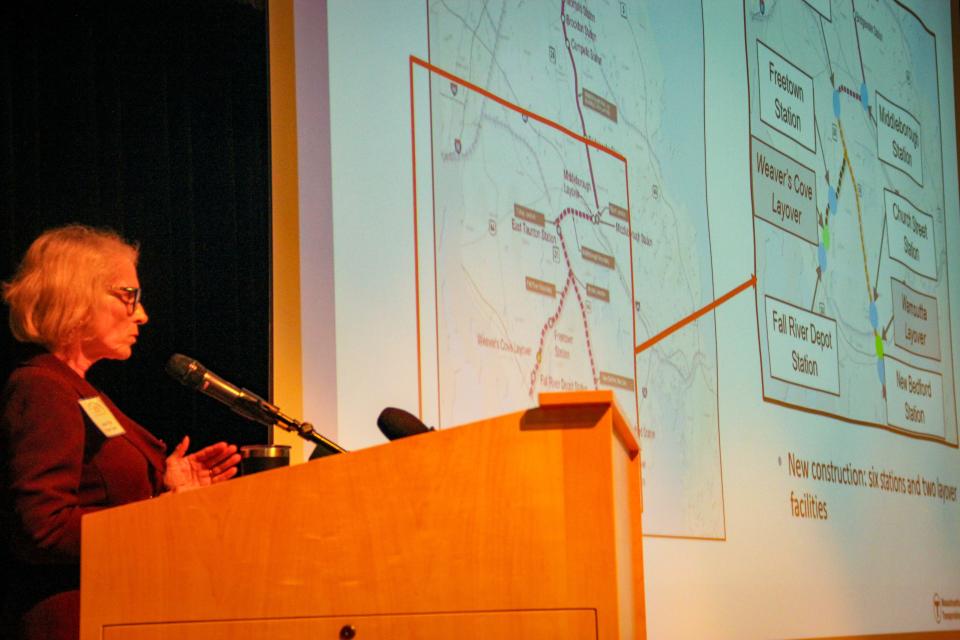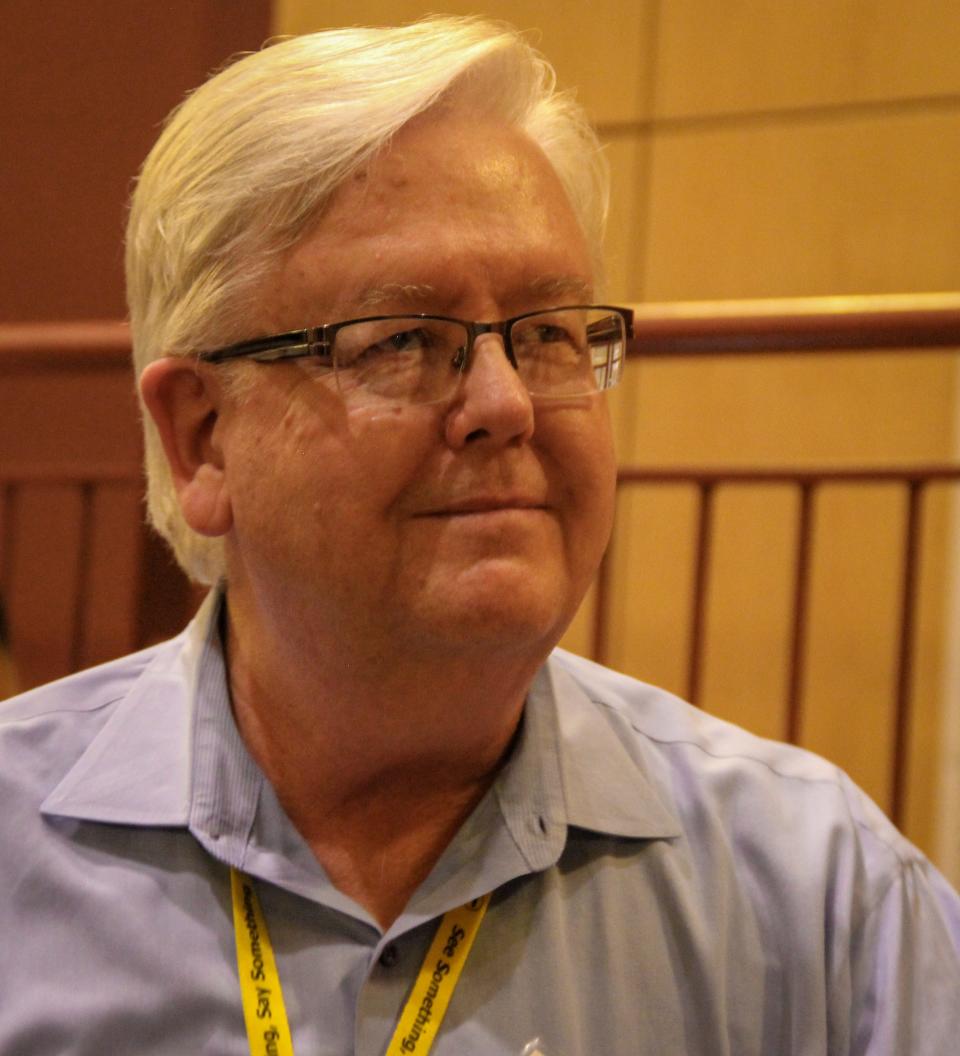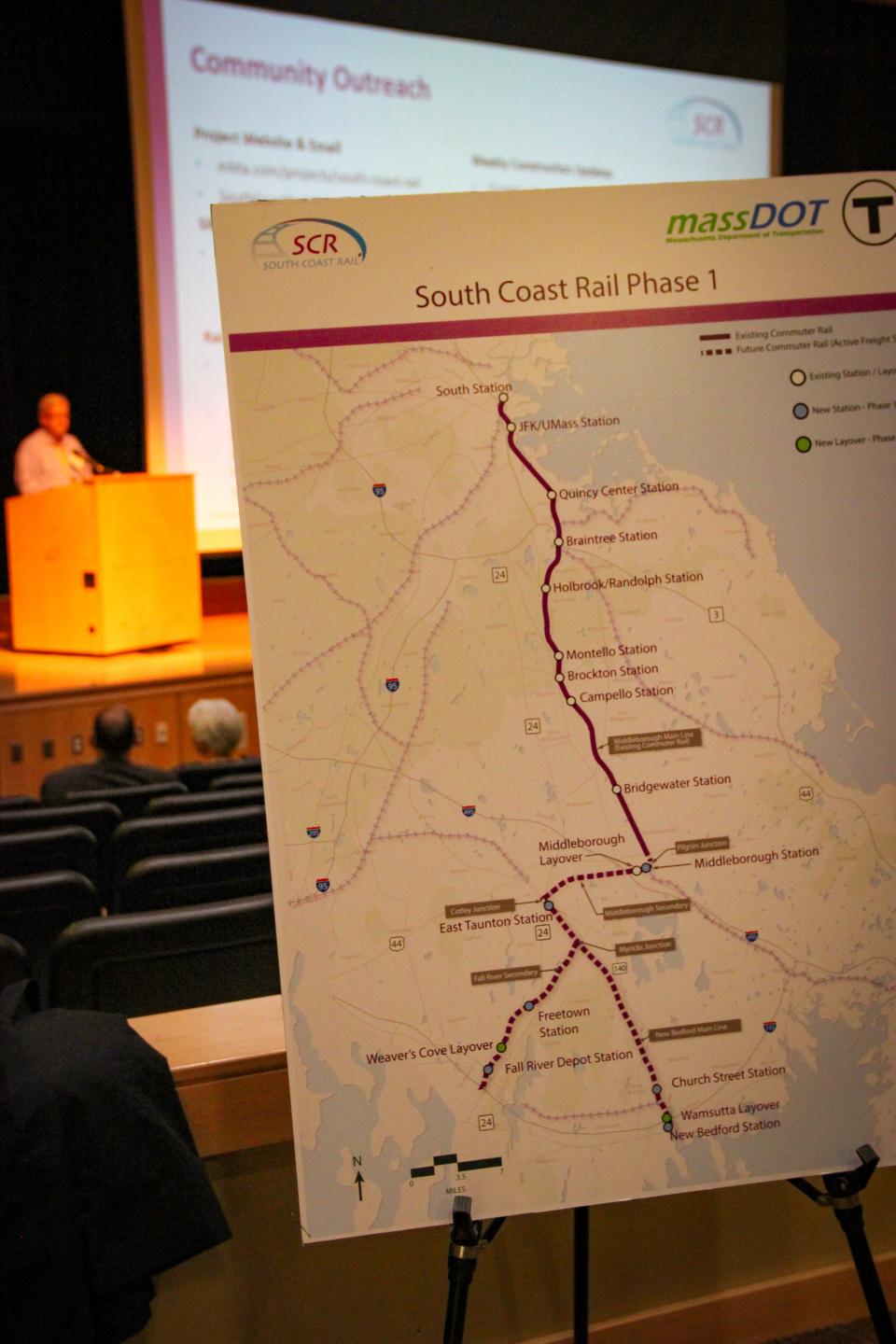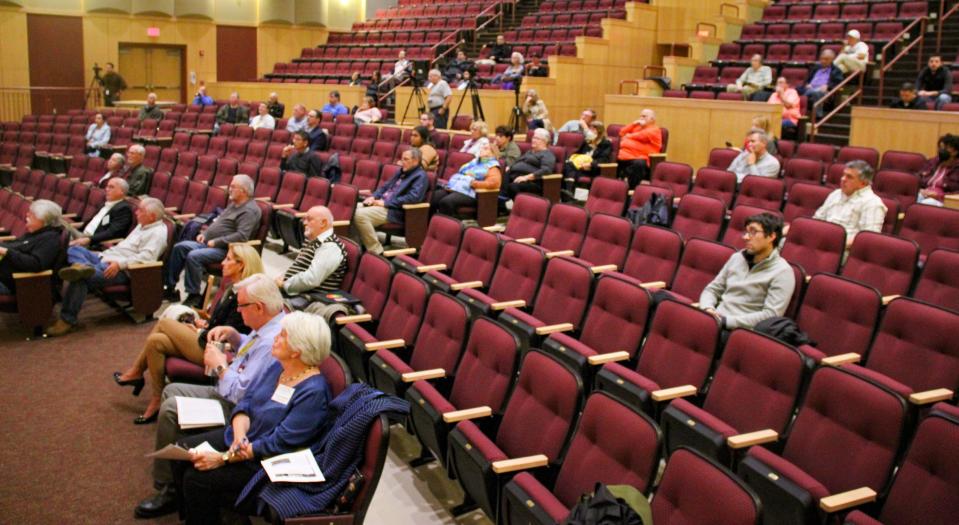The MBTA is pitching South Coast Rail benefits to voters. Not everyone is on board.
FALL RIVER — A public meeting hosted by representatives of South Coast Rail on Thursday night updated the community on the progress of the commuter line to Boston, but grew heated at times as a handful of residents voiced concerns about what MBTA membership might mean for the city.
Before any MBTA trains pick up passengers in Fall River, the city must elect to join the MBTA service area through popular vote on November’s ballot. In recent weeks, confusion and apprehension have spread about the repercussions of such a vote, and several residents voiced concerns before a small crowd in the Morton Middle School auditorium — about a third of a mile from the new Fall River Depot station on Davol Street.
Randy Hunt, senior director of administration for South Coast Rail, reiterated that while MBTA communities pay a fee for service, cities and towns that pay for regional transportation authority can have that funding count toward its MBTA bill. In Fall River’s case, the city pays more for SRTA bus service than it would pay to the MBTA, so it “zeroes out the assessment,” Hunt said.

On a roll: South Coast Rail's Fall River station is 90% complete — here's when trains hit the tracks
Hunt said Fall River’s calculated MBTA assessment would be about $600,000, but the city pays SRTA $1.5 million.
“That more than offsets the $600,000 and leaves you with a cushion of nearly $1 million," Hunt said. “So there is no net amount of money that Fall River will have to pay to the MBTA by voting to become part of the service area. That’s a fact.”
Hunt added that the MBTA’s assessment can increase annually up to 2.5%, but that the SRTA annual assessment can increase by more than that, which would mean the city’s cushion “is actually going to grow, not get smaller, as time goes on.”
SRTA financial reports say that its assessments "may increase by no more than 2.5% annually, plus the members’ share of any new services.” A review of reports available shows that in the past six years, Fall River’s annual assessment to SRTA has increased by an average of 7.35%, including a jump of 15.5% in fiscal 2018.

Moving into Corky Row: Two more apartment developments are in the works for Fall River. Here's what to expect.
What if Fall River voters say no?
The numbers weren’t enough to sway some residents like Nelson Vasquez, who said he is part of a “No to Rail” campaign. His view is fueled partly by concerns that zoning requirements in MBTA communities “removes local control as to what gets built around these train zones,” that the rail could spur more market-rate housing, and that the South Coast Rail project was initiated through the legislative process and not via a direct popular vote.
Taking to a microphone, he warned local state representatives in attendance that if the voters reject MBTA membership, “and there’s an attempt by the state delegation to override that vote, the ‘no’ side of the campaign … will initiate Article V [of the Massachusetts constitution]. We will hold you accountable.”
Article V of the state constitution is a statement that indicates that government officials “are [the public’s] substitutes and agents, and are at all times accountable to them.”
Rejecting MBTA membership in November would mean Fall River would have train stations but no rail service next year — the MBTA accepts communities each January.
When asked if it would be reasonable to reject MBTA service and abandon new train stations that have been built at a cost of over $1 billion in statewide taxpayer money, Vasquez said, “They spent the money. We didn’t spend the money. They started the project without the people’s consent. The people didn’t even have a say up until the 11th hour."
MBTA attorney Kevin Scanlon said that if Fall River voters reject MBTA membership on November’s ballot, the issue could be placed again on future ballots.
“There’s nothing in the statute that says ‘one and done,’” Scanlon said, adding that any subsequent vote would have to be passed to meet the MBTA’s deadline of each January.

Mostly complete, but more work to do
Jean Fox, director of Community Engagement for South Coast Rail, said the stations are mostly complete.
“We’re 90% on the civil work. There’s still all the communications work that has to happen, but the stations are going to be done, and the [Weaver’s Cove] layover done by the end of the year,” Fox said.
The same is true for the Freetown station being built on South Main Street in town, she said.
Fox said the construction schedule for the next 10 weeks will mean paving, striping, installation of lights, work on fiber optic cables, systems testing, landscaping and more.
“Construction, you’ve already lived through the best part of it," Fox said. “The stations and layover are going to look very much done. They do now, but there’s still an awful lot of work to do — it's just not as visible.”

Train timeline: Tracking Fall River's history from Old Colony Railroad to South Coast Rail
Hearing the benefits
Fox pitched the audience on the rail benefits, including better access to jobs in the metro Boston area, better access for local businesses to a bigger labor force, and an alternative to frequently congested Route 24.
"You don’t build all this stuff for nothing," Fox said.
Other residents voiced concerns about the vote’s perceived suddenness, and about the effects of increased development led by train service, including the specter of market-rate housing, with some shouting out of turn about the plans and the expense.
The South Coast Rail line will extend MBTA service to Boston for the first time, and provide passenger rail for the first time since 1958. In this Phase 1 of the South Coast Rail plan, stations are being built in Fall River, Freetown, New Bedford and Taunton, with layover stations to store trains overnight being built at Weaver’s Cove in Fall River and in New Bedford. The line connects to existing commuter rail service at Middleboro/Lakeville. Service is expected to begin by this time in 2023. A second phase of South Coast Rail, called the “full build," would include another passenger station further south at Battleship Cove; that phase is still being designed.
Some in the audience had a different view, including Stephen Kobialka, who said his co-workers in Boston who used commuter rail had only good things to say about the effects on their communities.
“New housing went up. Businesses came. The quality of life moved. … People who have commuter rail love commuter rail. I think this is going to be a great project.”
Resident Michael Farias said, “The economic benefits outweighs this tenfold. To not embrace this project and vote for a positive outcome of a commuter rail to this city — we’re blessed to have this opportunity.”
Dan Medeiros can be reached at dmedeiros@heraldnews.com. Support local journalism by purchasing a digital or print subscription to The Herald News today.
This article originally appeared on The Herald News: MBTA holds public meeting to answer questions on South Coast Rail

